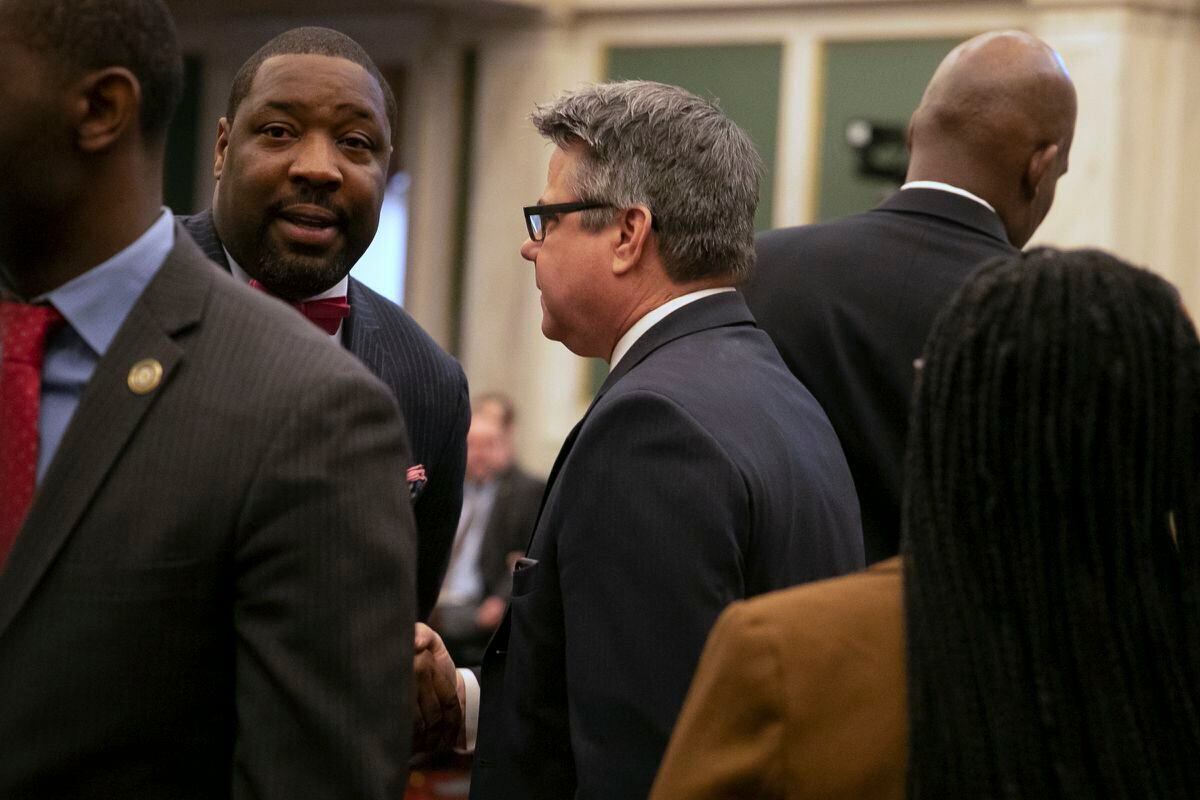
Should elected officials who are convicted of a crime and removed from office have any official role in choosing their successors?
With two members of City Council under indictment, it’s a question that Philadelphia Democratic Party leaders need to consider.
Neither Bobby Henon nor Kenyatta Johnson has been convicted of the charges brought against them, and they ultimately may not be, but in the event either man is convicted, they would be removed from their elected positions in City Council.
But both men are also ward leaders of the Philadelphia Democratic Party, and as such, could have a large influence over who is selected to replace them. The party’s bylaws do not currently prevent a person convicted of a crime related to their elected duties from holding a ward leader position, so unless something changes, Bobby Henon and Kenyatta Johnson could hypothetically have a direct vote on their replacements depending on the nature of their sentences.
Here’s how it works:
When a seat goes vacant in the middle of a term, the Democratic and Republican parties each select nominees for a special election. In a special election, there’s no primary first—party officials simply select nominees to run as the official standard-bearers. And since Democrats enjoy an overwhelming registration edge, the Democratic nominee is usually a lock to win.Within the Democratic Party, the process involves the ward leaders representing each of the wards comprising the relevant district getting together and voting on a nominee.
And because the districts don’t contain an equal portion of all wards—which are political units relevant for the siting of polling stations and also Party committee elections—the ward leaders’ votes on the special election nominee are weighted based on how many precincts their ward has in the district.
In the 2nd Council district, 36th ward leader Kenyatta Johnson would have the highest-weighted vote of any of the ward leaders over who the next Councilmember will be due to the 36th being the largest ward in the district. Johnson would control almost 24% of the vote for his replacement.
The 40th Ward in southwest Philadelphia is technically the largest in the 2nd District, but it’s so big it’s split into two sections—40A and 40B—each with its own ward leader. They would each control about 14% of the vote. The two wards to the south of Johnson’s 36th Ward in Point Breeze, the 48th in lower Point Breeze and West Passyunk, and the 26th in Girard Estates, each control about 13%. The Center City part is pretty small, with the 8th (Center City West) and 30th (Graduate Hospital) wards controlling about 20% combined. There’s also a little jaunt into Hawthorne and Bella Vista in the 2nd Ward that’s about 3%.
In the 6th Council District in Northeast Philadelphia, 65th ward leader Bobby Henon would control almost 15% of the vote for his successor in a special election scenario. The 6th District has a much more even distribution of precincts from different wards, and Henon’s 65th ward is the fourth largest of seven. 15% isn’t the full quarter of the vote Johnson would control, but it’s still pretty substantial.
It’s important to note that the legal system might foreclose on this possibility, even if the party system doesn’t have the quality controls. If Henon or Johnson were sentenced to prison, they may not be able to participate in a ward vote on a nominee. If they get probation, it’s possible. In one case from 2011 though, a judge stripped ward leader Carlo Matos of that position during his probation after serving prison time for a felony conviction. But it’s not unthinkable that there could be a window for a speedy ward vote on a new nominee. Kathleen Kane, for example, was convicted but out of custody on appeal for over a year and a half.
Philadelphia’s Democratic Party should consider how damaging to the public trust it would be if elected officials removed from office for crimes related to their official duties were allowed to hand-pick their own replacements.
There are a few ways party leadership could remedy this conflict before disaster strikes. One option would be to amend their bylaws to specify some circumstances under which people convicted of a crime in office must resign. Another option, which would also have other desirable political consequences, would be to ban elected officials from serving as ward leaders in a dual capacity.
Whatever the preferred solution, a little proactive planning now could prevent a lot of unnecessary embarrassment in the future.
Jon Geeting is director of engagement at Philadelphia 3.0
"Opinion" - Google News
February 03, 2020 at 09:56PM
https://ift.tt/2OmWqjm
With two indicted Councilmembers, it’s time for Philly Democratic leaders to change rules | Opinion - The Philadelphia Inquirer
"Opinion" - Google News
https://ift.tt/2FkSo6m
Shoes Man Tutorial
Pos News Update
Meme Update
Korean Entertainment News
Japan News Update
No comments:
Post a Comment